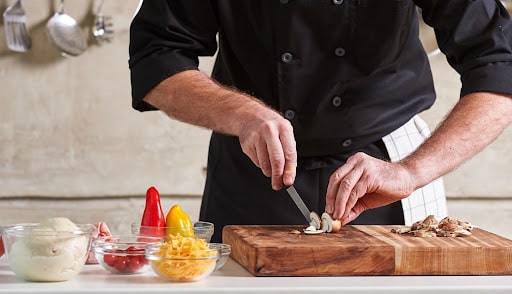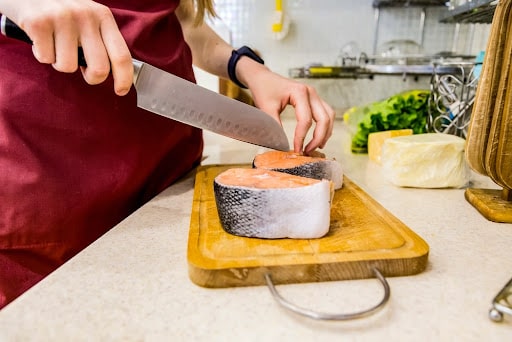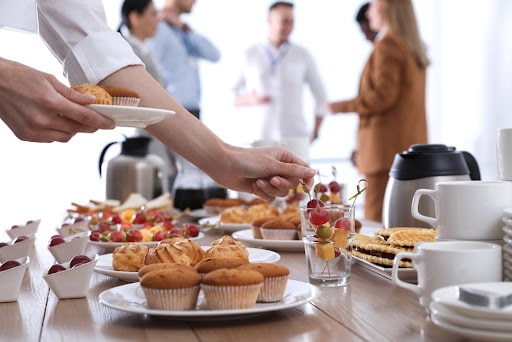
As a personal or private chef, you have enough on your plate without having to worry about finding the right private chef insurance policy.
Private and personal chefs have become more popular since the COVID-19 pandemic began. More people are opting to eat in vs. dine out. But with more opportunities for personal chefs to work, the risk of exposing yourself to liability has never been higher.
So we’re making things easy by breaking down what private chef insurance is, how to determine if you need it, and what type of food insurance is right for you.
How Private Chef Insurance Works
Private chef insurance protects personal and private chefs against third-party bodily injury claims, property damage, and theft of tools or equipment.
It also protects you against claims of food poisoning, food allergen negligence, stolen equipment, client injury, and slip-and-falls. Certain types of personal chef insurance are better suited to defend against certain types of claims (but more on that later).
All of these claims are grounds for lawsuits. With private chef insurance, you eliminate the risk of having to pay out-of-pocket legal and medical fees. You save money and gain peace of mind.
Do You Need Private Chef Insurance?
You should consider private chef insurance or food insurance if you:
- Are a personal chef or private chef who cooks for clients in their homes or caters for events
- Are a food vendor who hires chefs
- Are a food business owner who operates a food truck, catering business, or restaurant
In short, if you cater private events, own your own equipment, cook for clients in their homes, or cater for corporate events, bridal events, baby showers, etc., you’d probably benefit from private chef insurance.
And the fact is, many clients will require their chefs to have proof of liability insurance before hiring them, so it’s not a bad idea to have a policy already in place for those prospective clients.
As more people find personal chefs to be worth the cost, personal chefs have more opportunities to work than ever before. In fact, the job market for personal chefs is expected to grow 16% by 2031, faster than the national average for all occupations.
Without private chef insurance, you’re exposing yourself and your business to unnecessary risks that could potentially bankrupt you. The amount you spend on a policy is well worth it to hedge against the potential legal fees and medical expenses you will pay out-of-pocket if a claim is filed against you.
From food poisoning to kitchen fires, you want to make sure you’re covered.
Also, depending on the venue, you will not be able to provide your services without insurance to cover your business.
But what if the business I work for already carries catering business insurance? Do I need my own insurance as well?
That’s a good question. Business insurance in these instances typically covers the business but not the employees.
Even if the catering business you work for has its own insurance, it’s smart to have your own policy in case there are any gaps that expose you to liability. If a claim is filed against you and not the catering business, you might be forced to pay out-of-pocket.
For personal chefs who work in catering, learn more about why you need catering liability insurance.

4 Types Of Private Chef Insurance
So we’ve covered what private chef insurance is and who needs it. Now let’s dive into some specific types of insurance.
- General Liability Insurance
This insurance policy is the most prevalent kind of private chef insurance. The top risks you receive coverage for are property damage and third-party bodily injury.
If you are a private chef or work in food service, this policy provides the most comprehensive coverage. It protects you against customer claims, and it can potentially save you thousands of dollars.
Whether it’s personal chef liability insurance or restaurant liability insurance, getting general liability insurance for yourself or your business is a smart investment.
- Product Liability Insurance
The top risks you receive coverage for with product liability insurance are food poisoning due to negligence, unlabeled allergens, and foodborne illness.
If a customer files a claim against you because you made them sick, and you don’t have product liability insurance, you’ll be liable to pay their medical expenses out of your own pocket.
- Business Interruption Insurance
The top risks you receive coverage for with this kind of insurance are unforeseen circumstances that may cause an interruption to your food business (e.g. kitchen fires).
Without this coverage, your business may suffer a significant income loss during the time you’re forced to close and rebuild. Purchase business interruption insurance to maintain revenue during those times of uncertainty.
- Personal Indemnity Insurance or Professional Liability Insurance
Personal indemnity which is also referred to as Professional Liability Insurance or Errors or Omissions coverage protects private chefs if a customer wrongfully files a complaint against them related to the services provided. This insurance will cover your legal fees so you have a fair chance of defending yourself against wrongful complaints. It can also protect you from claims related to bodily injury and property damage.

What Other Types Of Insurance Do Private Chefs Need?
- Commercial Auto Insurance
If you do catering, operate a food truck, or commute with a commercial vehicle, you may also want to insure your catering vans or commercial vehicles. Specifically, you should look into collision damage, comprehensive damage, and liability coverage. Remember, a personal auto policy will not cover business pursuits.
- Liquor Liability Insurance
If you handle liquor as a personal chef, liquor liability insurance is a must. Especially because liquor liability has severe legal consequences.
This type of insurance will cover legal fees, settlements, property damage, and medical bills associated with claims filed against you. You’ll also be covered if you’re sued for physical injury, drunk driving, damages due to over-serving, serving alcohol to a minor, and third-party injury claims.
- Workers’ Compensation
You may want to look into workers’ compensation insurance if you operate a catering business with employees. Workers’ compensation insurance is an essential policy to have alongside your catering business insurance, food insurance, and general liability insurance and is required by law for your employees.
- Commercial Property Insurance
Commercial property insurance protects your equipment as a personal or private chef. This applies to valuables, paperwork, food storage boxes, induction cookers, outdoor coolers, and other essential equipment.
Even if you work in a client’s home or you rent your current space, commercial property insurance can still be helpful to protect your equipment and assets.
While working as a private chef comes with benefits, there are also risks.